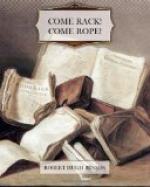“Come,” said Anthony in a sharp, low voice, “we must see the church.”
“Who is it?” whispered Mistress Alice, with even her serene face a little troubled.
For the first moment, as they walked towards the entrance of the church, Anthony said nothing. Then as they reached it, he said, in a tone quite low and yet full of suppressed passion of some kind, a name that Marjorie could not catch.
She turned before they went in, and looked again.
The priest was talking to the stranger, and was making gestures, as if asking for direction.
“Who is it, Mr. Babington?” she asked again as they went in. “I did not—”
“Topcliffe,” said Anthony.
III
The horror was still on the girl, as they went, an hour later, up the ebbing tide towards Westminster, in a boat rowed by a waterman and one of their own servants. About them was a scene, of which the very thought, a month ago, would have absorbed and fascinated her. They had scarcely passed through London Bridge finding themselves just in time before the fall of the water would have hindered their passage, leaving out of sight the grey sunlit heap of buildings from which they had come. All about them the river was gay with shipping. Wherries, like clumsy water-beetles, lurched along out of the current, or slipped out suddenly to make their way across from one stairs to another; a great barge, coming down-stream, grew larger every instant, its prow bright with gilding, and the throb of the twelve oars in the row-locks coming to them like the grunting of a beast. On either side of the broad stream rose the houses and the churches, those on this side visible down to their shining window-panes in the sunlight, and the very texture of their tiled roofs; those on the other a mere huddle of countless walls and gables, in the shadow; and between them showed the leafless trees, stretches of green meadow, across which moved tiny figures, and the brown flats of the marshes beyond, broken here and there by outlying villages a mile or two away. Behind them now towered the great buildings on London Bridge—the chapel, the houses, the old gateway on the south end, above which the impaled heads of traitors stood out against the bright sky. It was a tolerable crop just now, the priest had said, bitterly smiling. But, above all else, as the boat moved up, Marjorie kept her eyes fixed on far-off Westminster, on the grey towers and the white walls where Elizabeth reigned and Saint Edward slept; while within her mind, clear as a picture, she saw still the empty court, as she had seen it when the priest fetched them out again from the church—empty at last of the hateful presence which he had faced so confidently.
* * * * *




